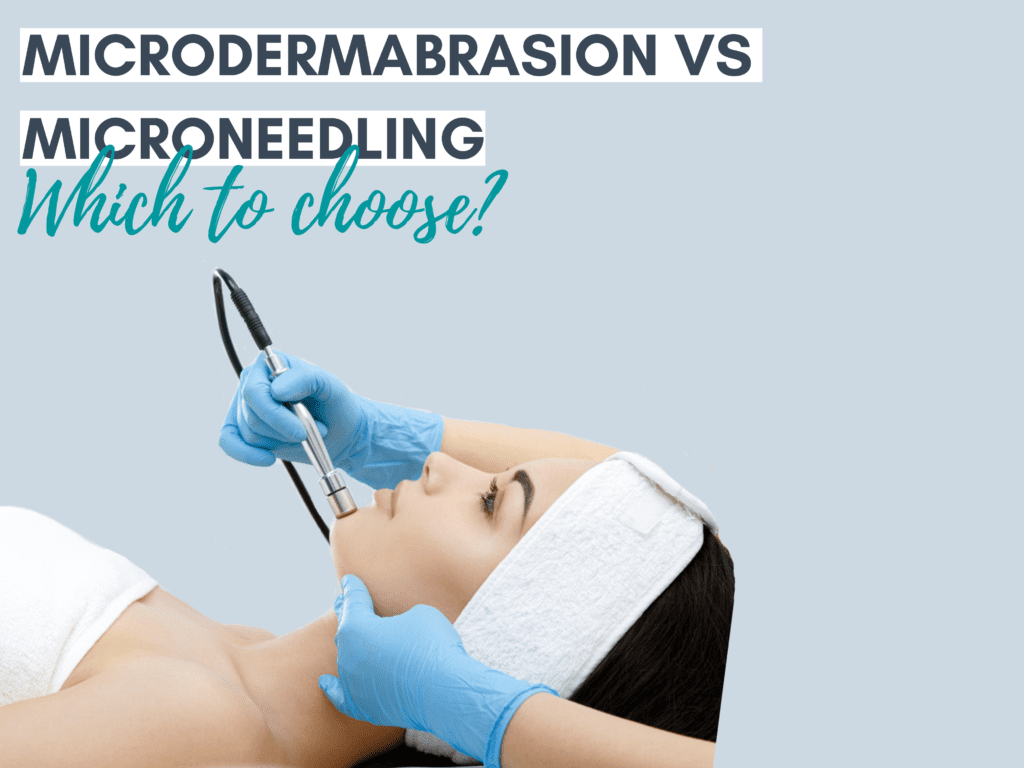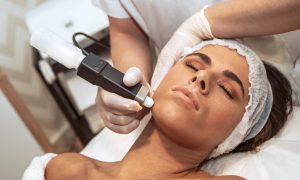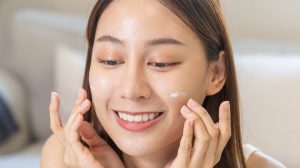Microdermabrasion vs. Microneedling: Which One Is For You?
- Last Updated: February 17, 2023
If you’ve been considering the benefits of microdermabrasion vs microneedling to improve your skin texture, then you’ve come to the right place! While microdermabrasion has been a staple for the skincare community since the 1990s, microneedling is still in the midst of gaining popularity amongst enthusiasts and experts. While they may give you the impression that they’re similar, they are actually two completely different things. Let’s take a look at how they work, what you can expect from the treatments, and how to choose between the two.

What Is Microdermabrasion?
Microdermabrasion is a non-invasive cosmetic procedure that uses mechanical abrasion to resurface the skin’s top layer. It was introduced back in 1985 as a less aggressive alternative to dermabrasion and chemical peels.

How Does It Work?
Microdermabrasion involves the use of a wand-like device to “sandpaper” the skin’s top layer. The device buffs away dead skin cells by using a rough-textured diamond tip or exfoliates the skin by spraying tiny crystals (often aluminium oxide) on its surface.
The exfoliation process will result in brighter, more even skin tone. The mildly abrasive treatment also encourages the body to produce more collagen, therefore improving the skin’s texture and helping to reduce acne scars, wrinkles, large pores, as well as hyperpigmentation.
Microdermabrasion works exceptionally well on its own, but it can also be paired with laser, chemical peels, microcurrent, and other cosmetic treatments.
What Is The Procedure Like?
The procedure of microdermabrasion is painless and doesn’t require numbing cream. If you’re getting the treatment done in a dermatological clinic, the medical provider will first clean your skin, then move the microdermabrasion handpiece across your skin in all directions to rub off dead cells and impurities.
Many providers apply serums after the procedure because exfoliation helps boost the penetrating ability of active ingredients. The serums applied post-microdermabrasion usually contain vitamins C, E, and A.
One microdermabrasion session will last around 15-60 minutes, depending on the size of the treatment area, and patients are usually required to undergo at least 6 treatments spaced several weeks apart to achieve desired results.
The experience of using an at-home microdermabrasion machine is practically the same, except you can get the treatment done conveniently at the comfort of your own space and time.
How Long Does the Recovery Take?
As a matter of fact, microdermabrasion is amongst the gentlest cosmetic procedures that requires little to no downtime. Some common side effects include a feeling of tightness, redness, and swelling, which often disappear within a few days. Remember to avoid scratching the treatment area, tanning, and taking hot baths for at least one week, and intense physical activity for 24 hours.
How Much Does Microdermabrasion Cost?
The cost of microdermabrasion varies depending on individuals’ skin concern, method of use (in-office treatment or at-home device), desired effect, and so on and so forth. The average cost of an in-office treatment is $167 whereas an at-home device is $118.
What Is Microneedling?
Microneedling is a non-invasive cosmetic treatment that was introduced after microdermabrasion. Instead of using crystals or a diamond-encrusted tip for mechanical abrasion, microneedling involves making tiny punctures on the skin’s surface to stimulate collagen production and cell regeneration.

How Does It Work?
Microneedling uses a handheld device or a microneedling pen with hundreds of tiny needles to make controlled wounds on the skin’s surface, stimulating the body’s healing mechanism and producing more collagen. In result, you’ll see visible improvement in skin tone and texture, as well as an alleviation of conditions such as wrinkles, acne scars, hyperpigmentation, large pores, stretch marks, and hair loss.
To deliver more optimal results, skin experts often pair microneedling with treatments such as radiofrequency and LED light therapy.
What Is The Procedure Like?
Microneedling is a little more painful than microdermabrasion, and medical providers usually apply a numbing cream on the treatment area after cleansing the patient’s skin. They move the microneedling device over the patient’s skin in all directions for roughly 20 minutes, causing a controlled injury. Finally, they proceed to apply a serum enriched with anti-aging ingredients such as hyaluronic acid and growth factors to benefit off of the skin’s improved absorbing ability.
There are at-home microneedling pens you can opt for, just make sure that you go through the user manual and follow the instructions closely to avoid any severe allergic reactions and injuries.
How Long Does The Recovery Take?
Microneedling will cause redness, swelling, and bruising in the treated area, which usually disappear after two weeks. The procedure won’t lead to any serious complications and is considered safe for healthy adults. During your treatment period, avoid participating in strenuous physical activity and applying pressure to the treated area to minimize side effects.
How Much Does Microneedling Cost?
An in-office microneedling treatment can cost you anywhere from $100 to $700 (depends on the number of required treatments) whereas an at-home microneedling treatment will cost you around $100 to $400.
Pros and Cons of Microdermabrasion
The effectiveness of a microdermabrasion treatment varies depending on the severity of the patient’s skin condition. Here’s a low down of the treatment’s pros and cons to evaluate its capability in resolving your skin woes.
Pros
- Amongst the safest, gentlest cosmetic procedures
- Suitable for all types and tones of skin
- Delivers a wide range of benefits, including but not limited to reduce wrinkles and scars, smooth out skin texture, and even out skin tone
- Causes mild, short-lived side effects
- Quick and convenient
Cons
- Requires a minimum of 6 treatments to see visible results
- Requires maintenance treatments
- Can’t treat deep wrinkles and folds
- Can’t treat sagging skin
- Not suitable for pregnant women and individuals with active acne, certain skin conditions (eczema, rosacea, etc), and cold sores
Pros and Cons of Microneedling
Below is a list of the advantages and disadvantages of microneedling.
Pros
- Suitable for all types and colours of skin
- Provides a myriad of benefits, from reducing wrinkles and scars, to tightening sagging skin
- Low-risk
- Quick and convenient
- A more affordable alternative to laser, botox, and dermal fillers
Cons
- The results are gradual
- More invasive than microdermabrasion
- Not suitable for pregnant women and individuals with bacterial infections, certain skin conditions, and bleeding disorders.
Microdermabrasion vs Microneedling for Acne Scars
Both microdermabrasion and microneedling can be used to reduce the appearance of acne scars. Both treatments work best on deep acne scars, not the ones that are raised. Having said that, microneedling is able to treat ‘deeper’ acne scars compared to microdermabrasion since microneedling pens reach below the surface of the skin.
Microdermabrasion vs Microneedling for Fine Lines
Both treatments are widely used to treat fine lines and wrinkles. Microneedling typically creates a longer lasting effect compared to microdermabrasion as microneedling pens create tiny injuries on the treated area, which naturally produces collagen to deliver that ideal smoothing and firming effect. Microdermabrasion on the other hand, reduces fine lines and wrinkles by buffing away the dull and dead skin cells from the skin surface.
Aftercare for Each Treatment
The aftercare for both microdermabrasion and microneedling are fairly similar. Skin is prone to be sensitive for a few days after each procedure. After treatment, you should avoid being exposed to the sun for the first 24 hours. During this time,you should also stay away from makeup or doing any intense activity that causes you to sweat as this can irritate the skin.
We strongly recommend you to visit a board-certified dermatologist before you kick start with any skin treatment in order to decide what’s right for you.

Celine So
Be mindful of your words as they are impactful, which also explains why I am so fond of writing.


